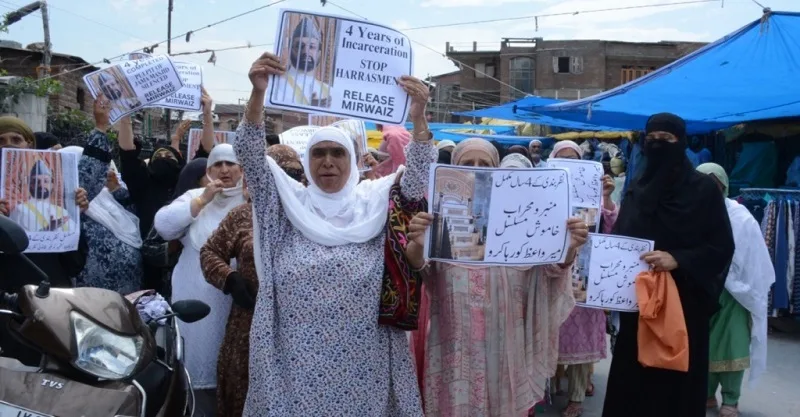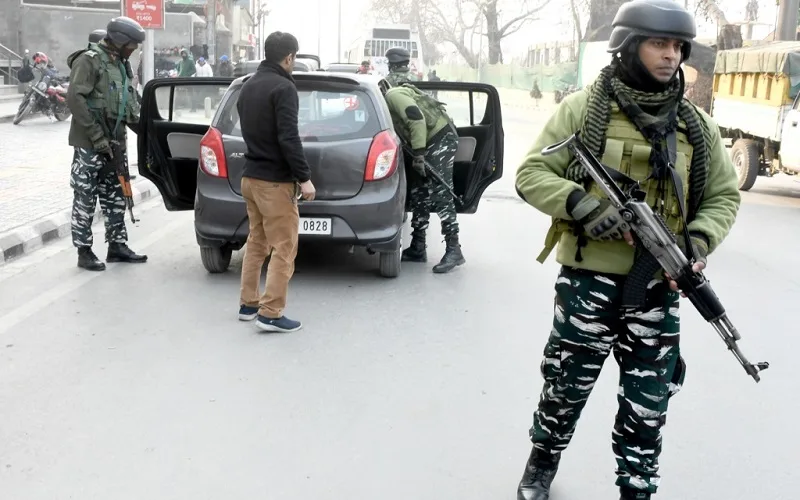The Indian state has papered over the silence of the media to push through a false narrative of development, democracy, and progress in Kashmir, making it a façade to hide the bigger picture.
By Anuradha Bhasin
For Prime Minister Narendra Modi, Kashmir continues to be an election prop. His chest-thumping about his ‘enthusiastic’ Kashmiri audience, which comprises forcibly corralled government employees, and his self-congratulatory remarks about peace and development conveyed that Kashmir continues to be a selling point for elections in the rest of India.
For the Kashmiris, still recovering from the shock of the Supreme Court’s verdict in December 2023 over the petitions challenging Article 370 dilution, in abject dissonance from the constitutionalities and merits of the case, such words proclaiming that ‘hearts had been won’ and ‘an era of progress established’ amount to rubbing salt over their wounds.
The hype versus truth
An imagined paradise that the Indian prime minister tries to weave glosses over the disenfranchisement of people of Jammu and Kashmir who have not had assembly elections since 2014. There’s also the exacerbated militarisation, the routine internet shutdowns, and the harassment of politicians, civil society activists, journalists, and dissenters to maintain a climate of fear, humiliation, and unproductiveness.
This has particularly been the case since 05 August 2019 when the government revoked Article 370, ending Kashmir’s historic semi-autonomy. The move to integrate the region and bring it under direct control of New Delhi partly disenfranchised the people, and the climate of tyranny has intensified exponentially with each passing day.
The prime minister does not speak about these ground realities, and the world remains ignorant because the media has been censored and silenced. The Indian government’s boastful claims of democratising Kashmir fall flat on several counts.
The signs of democracy are free and fair elections, a system of accountability, a healthy and participatory civil society, an independent press, and equitable development based on the needs and aspirations of the people. A cursory dissection of these essential elements of democracy will reveal that what is happening is simply the opposite.
A region without elections
Any fair assessment of electoral democracy in Kashmir must consider the history of political manipulation by New Delhi in the last seven decades. In the past, rulers have been overthrown and even jailed, and elections notoriously rigged. New Delhi has violated democratic principles by positioning its favoured politicians.
The Bharatiya Janata Party (BJP) government under Prime Minister Modi has completely disenfranchised Jammu and Kashmir. While no elections are held, coercive and intimidatory tactics like arrests and police raids have been employed to co-opt politicians or silence them.

After 2019, the once vocal civil society disappeared as nonprofit organisations and activists were intimidated and threatened with income tax and money laundering cases, and some faced anti-terror raids.
World-renowned human rights activist, Khurram Parvez, picked up under the Unlawful Activities Prevention Act (UAPA) in November 2021, remains in Tihar jail. His arrest impacted other activists working on the ground, halting their work entirely.
In even the most turbulent phases of Kashmir’s conflict, civil society has survived, and people’s resistance has been visible – though the ways of resisting change. Street protests, peaceful demonstrations, sit-ins, and creative articulation of dissent through art, poetry, writings, graffiti, and resistance were a part of everyday life.
Since 2019, such campaigns have stopped. Artistic resistance has gone underground, and even indoor public discussions are banned. Any debate about Kashmir by civil society members is disallowed in other parts of the country.
Independent press stifled
Today, free and independent press is nonexistent in Kashmir. Journalism in the conflict region was already challenging and already to some extent been compromised before 2019 when the BJP government began its stringent crackdown, starting from internet shutdown and progressing to harsher punitive actions like police raids, arrests, and criminal charges against professionals.
Four journalists are in jail, some of them under draconian provisions of anti-terror laws. Solidarity organisations like the Kashmir Press Club have been forced to shut down. Many journalists are barred from travelling abroad, and some have had their passports suspended. Repeated summons to police stations where journalists are subjected to long hours of detention and gruelling interrogation are a routine affair.
All this has instilled a deep fear among journalists, and many have resorted to self-censorship. Local newspapers are no longer critical of the government. They carry content about the government’s achievements on their front pages and are rewarded with government advertisements. In other words, the only kind of narrative that thrives in J&K is peddled or endorsed by the government.
Hollow development claims
There is increased talk about tourism and development but there is little evidence to show there has been an effective change. Besides, the government data from different sources is often contradictory and unclear. For example, in October 2022, the local press reported that investment projects worth ₹10,000 crore (about USD 1.19 billion today) were made in J&K, but the Ministry of Home Affairs (MHA) data released in parliament a few months later noted that the total investment in 2021-22 was only ₹376.76 crore (about USD 45.19 million today).
As for tourism, according to officials, “one crore” (10 million) tourists visited last year, and the projected number of tourists for 2023-24 is 20 million. These are unrealistic figures, unless the data for tourists and religious pilgrimages has been clubbed together, which effectively means that it is the same as it was about a decade ago.

External Affairs Minister S. Jaishankar has claimed that Article 370 revocation enabled the introduction of ‘progressive laws’. Such rhetoric, used to burnish the image of government, overlooks the fact that a massive restructuring of laws and policies, particularly those related to land, business investments and jobs have made it easier for the government to acquire substantial land holdings in the name of security or development as well as deem owners of lands (under previous laws) as ‘encroachers’.
The so-called ‘progressive laws’ have encouraged large-scale evictions, demolitions and an increase in homelessness (from less than 20,000 to about 200,000). With business contracts and investments now open to people from outside the state, big crony capitalists are getting to pay a pittance for land and contracts while the locals are being marginalised even concerning jobs in the government sector.
Distress and discontent
There is discontent today, not only in Kashmir Valley but also in Jammu and Ladakh, over the marginalisation of local businesses, economic losses, exorbitant electricity bills, and the ecological impact of the government’s reckless development plans.
Ladakh, which had initially celebrated the downgrading of the state and the revocation of its special status in 2019 is today out in the streets demanding constitutional guarantees, job opportunities, end to reckless development plans that are not aligned with the aspirations of the people and statehood. The voices from Ladakh convey what the silence in Kashmir fails to.
If we look at the significant identifiers of democracy – elections, strong civil society, independent media, equitable and inclusive development – none of this is part of ‘Naya Kashmir’ (new Kashmir) that the Indian government boasts about.
While a perception that the people of J&K are being integrated is being created, the reality is they have been increasingly alienated since 5 August 2019. With Article 370 of the Constitution struck off, people have been demoted and disenfranchised not just politically but also as citizens. Civil liberties are in tatters, not just through military repression but also through subtle actions and words. The veneer of silence hides the extent of disappointment, alienation, and anger.
There may be dangerous repercussions. We are already witnessing the increasing trajectory of militancy in Kashmir, which has extended from the Valley to the border districts of Rajouri and Poonch. The people’s silence cannot be interpreted as a “peaceful atmosphere.” That only makes us oblivious to the impending dangers.
Anuradha Bhasin is Executive Editor of the Kashmir Times, Jammu, a Senior Knight Fellow at Stanford University, and a member of the Advisory Council of Sapan News. The article is based on her talk for the Indian Diaspora Washington DC Metro, in 2023.
Note: The above piece was originally published by Sapan News on April 19, 2024.
